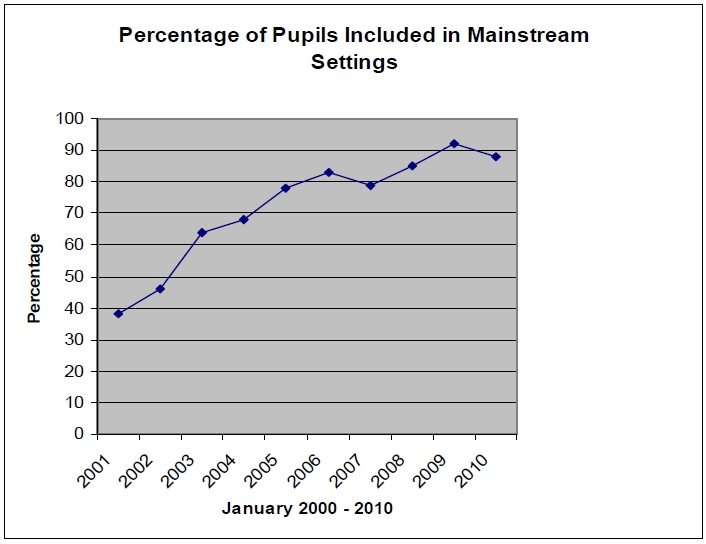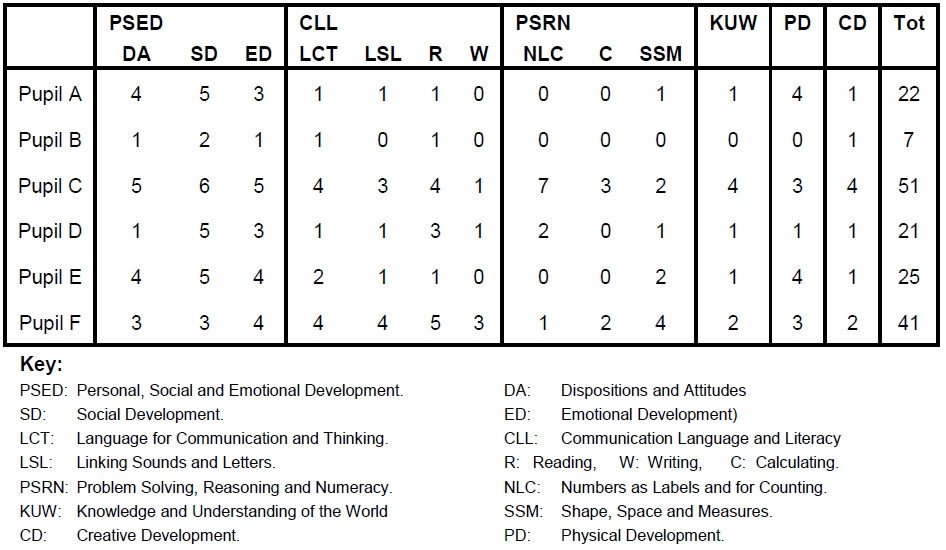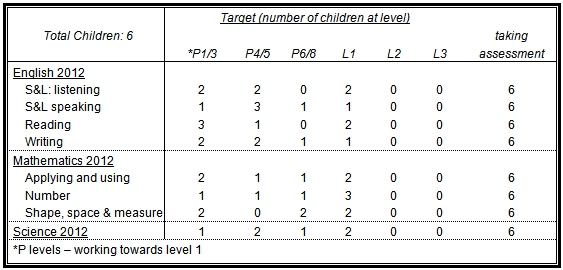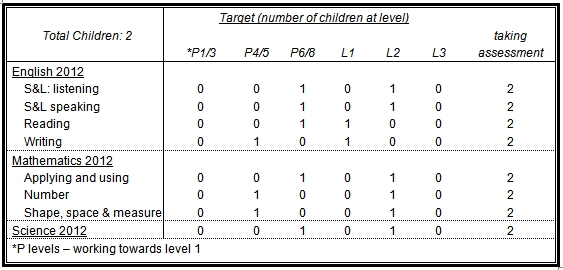Vranch House is a centre for the treatment of over 2,000 outpatients with physical difficulties, a provider of various therapies throughout Devon and an independent Day School in Exeter for children with significant physical difficulties.
Find out more...Last updated: 15/04/2024
Headteacher's Report 2010
VRANCH HOUSE SCHOOL PROFILE 2010
1) What have been our successes this year?
- In July 2010 Class 3 took three Year 6 children and 1 Year 5 child on a three day residential trip to Churchtown Farm. The visit was a great success, enjoyed by all. A short film of the visit is included on our School website.
- The automated canopies outside each classroom, which were included in our plan, have been installed during this year.
- We have continued training for mainstream teachers and TAs in association with Devon LA by running moving and handling courses.
- Our inclusion service continues to develop and become a focal point within the school. (See chart below) We are now extending the service to include our class teachers visiting mainstream colleagues.
- The ongoing speech and language training in Makaton and communication skills for all staff continues and is regularly monitored and updated.
- The school has raised funds for the Pakistan Flood Appeal, Breakthrough Breast Cancer Awareness and Living Paintings which has been our chosen charity.
- The Family Network has been renamed and re-launched as Vranch Chats, a group that invited speakers, on a range of topics into school to support parents, children and families with practical advice and guidance.
- The school council continues to generate ideas for improvements which include links with the community, increased visits to the inclusive playpark and fundraising discos twice in a week to ensure that all children can enjoy the fun and fundraising.
- The school underwent a satisfactory Child Safeguarding Audit, carried out by the Local Authority.
- Links have been firmly established with the charity Whizz-Kidz, which has included football skills and powered wheelchair skills workshops.
- We have begun working with Exeter University and other Special Schools in Devon to develop teacher training links.
- Introduction of Personal Education Plans and Policy to address the needs of children who miss significant amounts of school time due to illness. For example, fifteen consecutive days or more.
- Introduction of Music Therapy within school.
- Training to provide additional support for pupils with Profound and Multiple Learning Difficulties.
- Looking at the possibility of creating a sensory room in our resources room. There will be a large cost implication with this project as we will have to relocate our resources and the project cannot begin until the new Assessment Centre has been built.
- Training to enable a Qualified Teacher of the Visually Impaired within school. A mandatory requirement for all schools teaching children with visual impairments.
Chart: Inclusion

Eighty-eight percent of pupils were included in mainstream schools on shared placements in January 2010. This is a slight decrease on last year's figure of ninety-two percent and this is due to the arrival in school of new children who are not attending mainstream school at present due to their complex medical difficulties. We also have two children who have moved from Early Years to Key Stage 1 for whom mainstream inclusion is not appropriate at present.
2) What are we trying to improve?
Whole School Priorities for 2010 - 2011
- Develop Curriculum Planning - linking whole school curriculum to Early Learning Goals
- Develop access to Physical Education throughout school during class and lunchtime activities
- Inclusion - increase contact and liaison between mainstream schools and Vranch House School
- Integrate the use of Developmental Journals within school assessment procedures
- Streamline target setting within school
3) How much progress do pupils make?
Pupils at Vranch House School make good progress when their baseline achievements are taken into account. The following section describes the results for Foundation, Key Stage 1 and 2 assessment during 2009/10. The results are compared to targets set two years previously.
Foundation Stage Assessment
The results of the Foundation Stage Assessment show a broad range of abilities this is demonstrated by the results for the six children assessed in 2010.
In the national data for 2009 the majority of children are shown to be working securely within the early learning goals for all assessment areas - 6 points or more. Only one pupil was working securely within the early learning goals in two areas. Most pupils are working towards early learning goals in the majority of subjects with four out of five working within the early learning goals for at least one subject. This reflects the intake at the school with pupils working at a range of levels from developmental to within the normal range in some assessment areas.

National Curriculum Results for School Year 2009/2010
Key Stage 1
There were no children eligible for assessment in Year 2 so no Key Stage 1 assessments were recorded other than teacher assessments. One child who attends mainstream school for the majority of the week was not assessed as this was postponed until May 2011. This decision was made by the mainstream school.
Future Target for Key Stage 1 Assessment for year 2011/2012
The target is based on EYFS assessment supported by data from PIVATs and Durham assessments for the six pupils who took part in EYFS in 2009/2010.
It is anticipated that three of these 6 pupils will have moved to full-time placements or changed placements by 2012.

Key Stage 2
There were three pupils in Year 6 for Year 2009/2010. The target was to achieve mainly level 1 and 2 overall with one scoring P8 for English.
This target was fully met in maths and science. In English the target was partially met with all pupils achieving Level 1 or 2 in speaking and listening.

Future Target for Key Stage 2 Assessment for Year 2011/2012
There were two Year 4 pupils in 2009/10 targets are based on assessments in July 2010.

4) How have our results changed over time?
At Key Stage 1 pupils achieve a range of scores from working towards level 1 and level 2.
At Key Stage 2 there has been an overall decline in the levels achieved. This is because pupils who achieve higher levels at Key Stage 1, have by year 6 been fully included in their local mainstream schools. The remaining Key Stage 2 children have been typically working at P levels or Level 1 and 2 and mainly moving on to specialist secondary provision.
5) How are we making sure that every child gets teaching to meet their individual needs?
- Individual IEPs linked to statement of special educational needs and annual review, with a focus on personalised learning, individual needs and life skills development.
- Formative and summative assessment including; Pre-entry assessment, Early Years Foundation Stage Curriculum profiles, assessment for learning Key Stage 1 and 2 assessment, annual assessment of National Curriculum and P Scale levels, annual school report, annual review report.
- Annual monitoring of pupil progress using PIVATS data analysis and Durham data analysis.
- Moderation of individual pupil assessment, including links with mainstream schools.
- Regular meetings between staff to ensure children's needs are met.
- Visits from Educational Psychologist and LA Advisory Teachers.
6) What have pupils told us about the school, and what have we done as a result?
- Pupils wanted to access outdoor grounds more effectively and so we have developed the outdoor area for leisure and curriculum based activities.
- Pupils enjoy using play station activities so these are available during the lunch time period.
- Pupils have enjoyed the interactive displays in the corridors and we are continuing to develop an interesting indoor environment.
- Pupils have the choice of school meals or bringing packed lunches.
- There is a school council through which pupils have an opportunity to contribute towards decisions made.
7) How do we make sure our pupils are safe and well supported?
- School nurse on duty at all times.
- Good levels of staffing.
- Pupils are encouraged to let staff know if they have any problems.
- Regular clinics held at school: paediatric, orthopaedic, orthoptic, audiology and wheelchair clinics.
- Children's diets monitored.
- Effective induction of new staff.
- Provision of healthy snacks at break times.
- Good standard of moving and handling, including regular updates and training.
- Comprehensive health and safety policy with regular premises checks.
- Closed circuit security cameras outside the building.
- Good security procedures - registration of visitors, car parking permits.
- Regular fire drills.
- High levels of investment in buildings and equipment and regular maintenance.
- Safeguarding policies in place and a high level of staff awareness.
- Liaison with mainstream schools regarding issues such as attainment, moderation and attendance.
8) How do our absence rates compare with other schools?
- Total number of pupils of compulsory school age on roll for at least one session - 17.
- Percentage of pupil sessions (half days) missed through authorised absence - 5.1% and through unauthorised absence - 0.1 %.
These figures are slightly higher than those for the previous year (3.5% authorised and 0.0 unauthorised). This reflects the increased medical needs of pupils. However, the figures compare favourably with those given by DCSF for special schools i.e. 8.58% authorised absence and 2.14% unauthorised absence. (National Statistics published March 2010).
9) What activities are available to pupils?
- Broad and balanced curriculum.
- Music therapy sessions for individual children and small groups.
- Outdoor nature trail and classroom including tracker mobility device.
- ICT - children individually assessed and given full access to ICT with fully accessible Learning Resource Centre.
- Swimming / hydrotherapy.
- P.E. and Swimming badges/certificates (as appropriate).
- Holiday wheelchair workshops.
- Range of educational visits off-site e.g. Churchtown Farm Residential, St George V Inclusive Playpark, Odeon Cinema, Donkey Sanctuary
- Links with Whizz-Kidz Charity and other special schools, ie Ellen Tinkham School
10) How are we working with parents and the community?
- Regular parents' activity groups within school - Vranch Chats, parents' signing and moving and handling courses and Therapy Open Weeks.
- Regular consultation with parents - individual parents' meetings, ILP consultation, annual and interim review meetings.
- Two parent representatives on the Governors.
- Wheelchair workshops during holidays.
- Therapy sessions provided during holidays.
- Fund raising activities for charities by the children including Living Paintings and Pakistan Flood Appeal
- Christmas Fayre.
- Student placements from local colleges and universities.
- Links on a Soundbeam project with South Dartmoor Community College.
- Support from local businesses and associations e.g. Moto Services, Rotary Club Devon, Wooden Spoon.
- Parents and families invited to school events e.g. school play, Easter Bonnet parade, Achievement Awards assembly, Harvest Festival.
11) What do our pupils do after leaving this school?
Most of the pupils continue their placements in their mainstream partner schools. Some pupils go on to secondary mainstream or special schools depending on what is the most appropriate provision for the child's individual needs.
12) What have we done in response to Ofsted?
Extracts from Ofsted report in May 2009:
‘Vranch House School provides an outstanding quality of education. ‘
‘Teachers, therapists and support assistants form a very strong team and create a very strong team and create an extremely caring environment where pupils are encouraged to try their best.'
‘Pupils make outstanding progress and their personal development is outstanding.'
‘Excellent Early Years Foundation Stage provision'.
What the school could do to improve further:
- Ensure that the timetable for pupils on part-time placements includes sufficient balance between subjects.
New school/school/home diaries have been established, timetables and IEPs are shared. The inclusion service maintains regular liaison between both schools. Paying particular attention to writing skills development whilst maintaining reading, and numeracy.
- Make pupils' targets more precise to enable small steps in learning to be recorded.
Training in writing SMART targets, close liaison between education, therapy and medical staff, sharing targets with pupils. Provision mapping of staffing levels linked to individual pupil targets for curriculum and independent living skills acquisition
- Make better use of the outdoor space to promote (learning in the Early Years Foundation Stage.)
Improve provision for children with profound and multiple learning difficulties by staff and pupils undergoing Soundabout training and implementing a sensory curriculum at regular intervals as appropriate.
Implement new policy regarding children with exceptional additional medical needs, necessitating periods of time absent from school to ensure links are maintained and children are supported educationally, socially and physically. To include regular liaison with parents/carers and a personal education plan.




